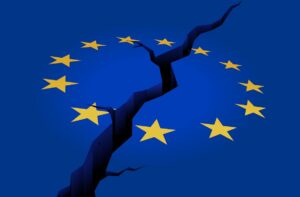The Growing Tensions in the EU: A Call for Increased Military Aid to Ukraine

As the geopolitical landscape shifts unpredictably, German Finance Minister Jörg Kukies is advocating for a significant increase in military aid to Ukraine, urging the European Union (EU) to invoke an emergency clause. This clause would allow EU nations to substantially exceed their defense spending limits, indicating a desperate need for bolstering military capacities in response to ongoing threats.
A More Alarming Proposal
In his recent correspondence to Brussels dated April 24, 2025, Kukies highlighted the urgent requirement for a strategic overhaul: “The changing environment in Ukraine requires a significant build-up of defense capabilities, profoundly impacting public finances.” If implemented, this proposal would mandate EU member states to allocate up to 1.5% of their GDP towards Ukraine over the next four years. Kukies is also pushing for a redefinition of what constitutes “defense” spending, advocating for a comprehensive approach that incorporates “dual-use expenditures.”
Germany’s Heavy Investment
Incoming Chancellor Friedrich Merz is set to implement a staggering €1 trillion funding package aimed at aiding Ukraine’s military and infrastructure. This substantial financial commitment raises critical questions about Germany’s role within the EU—far from being the region’s leader, many argue that it appears to be dragging its allies deeper into economic strife. Critics contend that this is less about altruistic support for Ukraine and more about establishing a cycle of perpetual conflict that justifies increasing government power and further encroachment on individual liberties.
Divergence Within the EU
Despite Germany’s apparent readiness to spend, not all EU nations are as enthusiastic. The hesitance from countries like Italy and Spain reflects significant concerns about taking on additional debt for Ukraine’s aid. Spanish Finance Minister Carlos Cuerpo voiced a provocative question that sent ripples through Brussels: “If Europe prides itself as a solid consolatory force, why not consolidate our debt?”
Spain’s Innovative Proposal
In response to the financial strains, Spain has introduced an intriguing concept: a temporary Special Purpose Vehicle (SPV) designed to restructure defense debt away from national balance sheets. The idea is to issue joint European bonds or similar instruments, allowing EU and non-EU countries to contribute and share repayment obligations.
However, there are significant hurdles. Larger economies within the EU are unlikely to welcome shared debt obligations, especially given the historical context of the euro, where lower GDP nations have often felt marginalized, facing the brunt of financial strains while stronger economies—like Germany—have not been willing to forgive debts.
A Precarious Future
The current economic climate presents a stark warning. Advanced modeling suggests that Europe is teetering on the brink of depression, weighed down by its own financial burdens. There is a pervasive concern that the EU’s undemocratic structure is creating instability as it attempts to counter external pressures, particularly from Russia. As a result, member nations may find themselves spiraling into debt, compelled to finance a conflict that is not inherently their own.
The Takeaway
The disconnect between Germany’s aggressive military funding and the hesitance of many other EU nations reveals a Europe grappling with identity and purpose. As we stand at a crucial crossroads, the decisions made in the coming months will shape the future not just for Ukraine but for the entire European continent.
Explore more about the dynamics at play in Europe and how they might impact your investments by following us on Extreme Investor Network—your trusted source for insightful analysis and strategic insights in today’s financial landscape.

